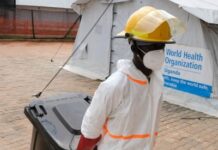In an alert on Tuesday, the UN human rights office, OHCHR, confirmed that three children were killed by Rwanda-backed M23 armed group in Bukavu, the city in South Kivu which fell to the fighters on Sunday.
“Our office has confirmed cases of summary execution of children by M23 after they entered the city of Bukavu last week. We are also aware that children were in possession of weapons,” said OHCHR spokesperson Ravina Shamdasani. “We call on Rwanda and M23 to ensure that human rights and international humanitarian law are respected.”
The OHCHR spokesperson also condemned attacks on hospitals and humanitarian warehouses as well as threats against the judiciary, directly linked to the rapid advance of the M23 fighters across North Kivu and South Kivu.
Burundi-bound
The crisis has uprooted hundreds of thousands of vulnerable people in a matter of weeks in eastern DRC and between 10,000 and 15,000 people have now crossed into neighbouring Burundi in a matter of days, according to the UN refugee agency, UNHCR.
The majority of those arriving in Burundi are Congolese, and they have mainly come from the outskirts of Bukavu, where the situation is deteriorating.
These newly uprooted families and individuals join more than 91,000 refugees and asylum-seekers from DRC who arrived decades ago, said UNHCR spokesperson Matt Saltmarsh.
“The situation in the eastern DRC remains extremely challenging and fluid, with recent clashes in South Kivu forcing more than 150,000 people to flee,” he added. “At least 85,000 of these individuals are living in newly created spontaneous sites for internally displaced people, where basic services such as water, shelter and access to health are in extremely short supply.”
Eastern DRC is a mineral-rich region that has seen decades of instability amid a proliferation of armed groups which have forced hundreds of thousands to flee their homes, often seeking safety in displacement camps or in neighbouring countries.
Fighting escalated sharply in late January as the largely-Tutsi M23 fighters seized control of parts of North Kivu, including areas near Goma, and advanced towards South Kivu and the eastern DRC’s second city of Bukavu.
Prison break threat
Other worrying developments stemming from the crisis include break-outs from Kabare and Bukavu central prisons on 14 February, OHCHR’s Ms. Shamdasani noted.
“We have received protection requests from victims and witnesses; they fear retaliation from escapees, given their active participation in the trials against some of these prisoners convicted of grave human rights violations and abuses, some of which amount to international crimes,” she told journalists in Geneva. “We also have concerns for the safety of lawyers and other judicial staff.”
The OHCHR spokesperson added that journalists, human rights defenders and members of civil society organizations have also been threatened and forced to leave the area.
“Others are still stuck in Bukavu and Goma and expressed fear for their safety due to their active engagement for human rights and their denunciation of violations and abuses committed by Rwanda and M23 in various territories of eastern DRC.”
In response to the unfolding emergency, UN human rights chief Volker Türk called on Rwanda and M23 to protect all individuals in territories under their control.
“He expresses his horror at the events unfolding in South and North Kivu and the impact this is having on civilians,” Ms. Shamdasani said. “The violence must stop immediately. All parties must respect international humanitarian law, in particular regarding the protection of civilians and human rights law, and resume dialogue within the framework of the [regionally backed] Luanda and Nairobi processes.”





























